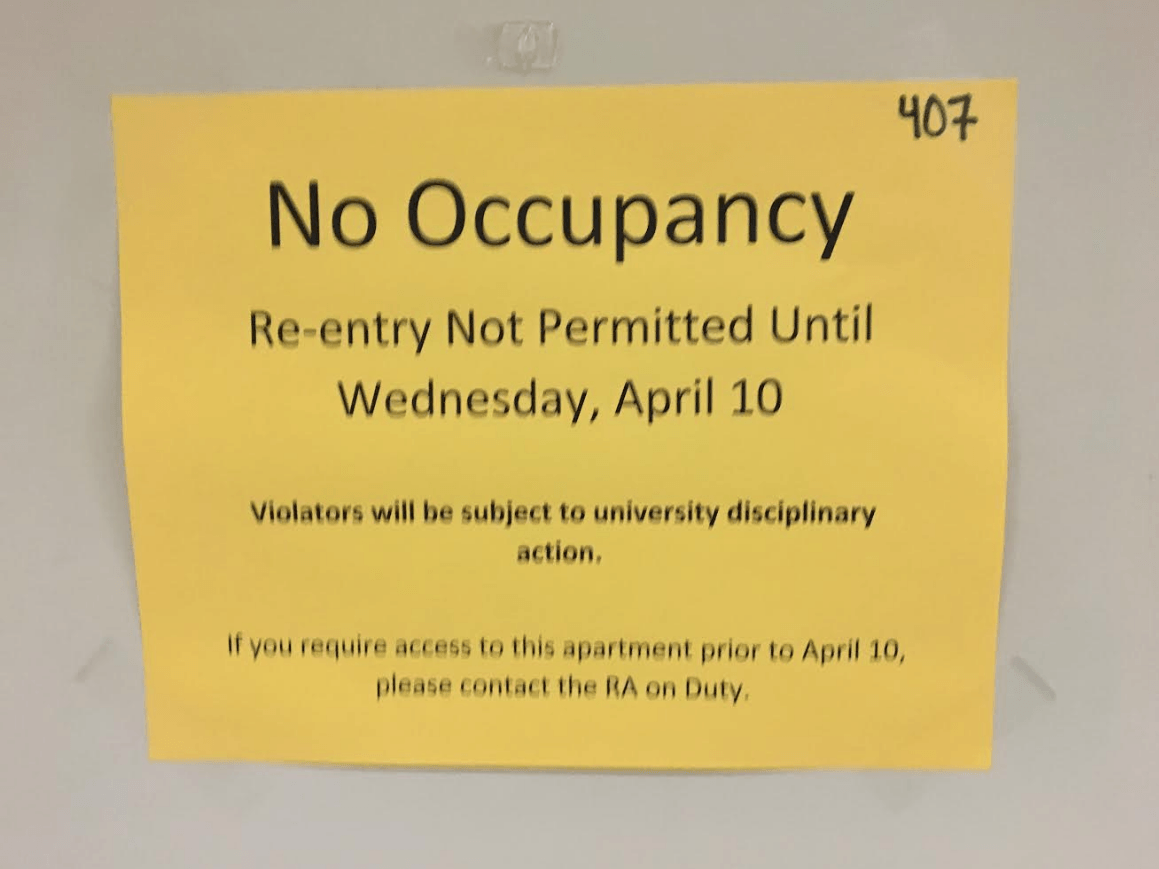Students affected by pipe burst in Eagle Landing
8 min read
Lauren Closs | The Blue and Gray Press
By LAUREN CLOSS
Editor-in-Chief
A hot water pipe burst in room 507 of Eagle Landing at 9:50 a.m. on April 6, spraying the facilities worker that had come to address a work order, sending water throughout all five floors on the north side and displacing 112 students.
According to Hannah Checkeye, a resident of 507, the water shot across the kitchen, reaching her room in 30 seconds.
Checkeye and her roommates first noticed the ceiling tiles above their fridge leaking on Friday at around midnight and called the campus police non-emergency number.
“They sent a cop down, and he said his job was to find out if it was something that needed to be dealt with right away, or could be put off until the morning,” said Checkeye. “He lifted up the tile and saw how much it was dripping but he didn’t find which pipe it was.”
The police officer told the residents to put in a work order and maintenance would come in the morning.
“The guy came in the morning really early at like 8:30 or 9, he went up, took all the insulation out that was around it, found what pipe it was,” said Checkeye. “He said it was a sprinkler system pipe and where it was connected was leaking. He said he had to go call someone since it was the sprinkler system, it was a safety concern. When he was gone, it started misting on me. I was standing in the kitchen making breakfast and it was just this mist.”
Checkeye called campus police to report the change and ask for the maintenance worker to come back. When he went to check the pipe again, it burst.
“It was dirty brown water that was like steaming,” said Checkeye. “It was really hot; that’s what set the fire alarm off. And obviously we were running around trying to get stuff off the floor so we did not answer the phone and it set of the whole Eagle [alarm].”
Fire alarms initially sound only in individual apartments in Eagle Landing. If students fail to answer a landline call from the front desk, alarms sound building-wide and the whole complex is evacuated.
John Wiltenmuth, the vice president of Facilities Services, said that the damage was due to a broken plastic water manifold. “UMW Facilities Services has determined to replace the other manifolds of this type with metal ones this summer,” said Wiltenmuth.
Checkeye said in the five minutes it took to move their belongings, the water had reached her bathroom and she was splashing through water on her way out the door.
Most Eagle Landing residents did not know the cause of the fire alarm until after they got outside, where many rumors were spreading.“I just assumed someone burnt something…and they didn’t answer the phone in time, and that’s why we were all having to leave,” said junior American Studies major Ellora Larsen. “We all went downstairs and that’s when [an RA] was yelling ‘this is not a drill’ in the staircase.”
Third floor resident Adam Cooper said he “heard water from behind the room where the water heater is, and then the fire alarm went off and when we were walking out we could see water coming out from under the door.”
Residents were outside for about 50 minutes before RAs instructed north side and south side residents to separate. South side residents were allowed to reenter the building but instructed not to enter the north side. North side residents were corralled into the rotunda around 11 a.m. to wait for more information.
“They basically held us hostage in the rotunda from about 11 a.m. to 2 p.m. or so,” said senior biology major Emily Contompasis.“While we could have left, they were giving us so little information that we didn’t have any idea where to go.”
Residence Life staff entered the rotunda again at around 11:30 to tell students that the water had just been shut off and that some residents may get displaced.
Wiltenmuth said the delay in turning off the water was because “the general maintenance technician on site mostly works at UMW Apartments and was unfamiliar with the location of shut off valves. He contacted his supervisor and others to come to the campus for assistance.”
Facilities is now “evaluating means to improve the access of critical building information to our staff,” according to Wiltenmuth.
According to the assistant dean for Residence Life and Housing, Dave Fleming, when the fire alarm went off “Emergency Management and Safety and Facilities partnered with the City Inspector and Fire Marshal to assess the safety of the building.”
Facilities reacted with “visual assessment of the entire north tower followed by water removal and extraction by a service contractor,” said Wiltenmuth.
Meanwhile, students waited in the rotunda or elsewhere on campus to regain access to their rooms.
“I didn’t have my EagleOne [card] because I thought it was just a fire drill,” said Larsen. “I asked [an RA] if I could go up to my room to get my EagleOne and she said ‘no, your room is pretty bad.’ I just had to sit there in the rotunda forever because I didn’t have my EagleOne and I couldn’t really go anywhere. I didn’t have my wallet, I couldn’t do anything. My friends and I ended up going to Greens and Grains and I venmoed my friend for my salad.”
Senior biochemistry major Eva Danelle left with her roommates to get breakfast.
“I was still in my pajamas and my roommate was still in her pajamas. We didn’t have anything…so we went to her boyfriend’s house, who lives in the UMW Apartments and just hung out there all day,” said Danelle, who lives on the fourth floor of Eagle. “I was really stressed all day because I had planned on getting up and working on my senior seminar presentation…and I couldn’t get access to my things. They wouldn’t let me go in even with an escort for like five hours.”
According to Larsen, residence life staff entered the rotunda around 2:30 p.m. and announced residents of rooms 06-09 on each floor could go to their rooms with an RA escort to get essentials. She said they were told they had 20 minutes to pack for 48 hours.
Fleming indicated that “some students were asked to collect their belongings early in order for clean-up crews to move equipment into their spaces.” Other students were unable to enter their rooms until later, depending on how fast their rooms were inspected and cleared.
Larsen said, “it was stressful because I walked into my apartment and there was water on the floor, like puddles of water. They took our carpet away and there was also no shower curtain….There’s also no ceiling in my bathroom. There’s no tile so you can look up into the structural part.”
Students that were not present in Eagle on Saturday morning were notified by the University with the campus-wide email at 3:51 p.m., six hours after the pipe burst.
“We were all stressed because we were in D.C., and we left early to come back to see our room,” said sophomore sociology major and fifth floor resident Julie Sargent. “The RAs weren’t letting our friends go into our room to try and save our stuff. They maybe could have saved some of our textbooks or something but they would not let them go up.”
Sargent started a GoFundMe for students that had belongings damaged in the incident. She said she had several textbooks rented from Chegg that were ruined, as well as bedding and other items.
Residence Life did send out an email indicating that they would provide EagleOne money as necessary for students to dry wet items. The University also provided Sodexo with a list of displaced students and offered to absorb the cost of meals for students who don’t have sufficient swipes remaining on their meal plan.
However, some students said it was not clear that this offer only includes meal swipes into the UC.
Danelle said, “I used meal swipes I probably would have budgeted for the rest of the semester, thinking that the University would reimburse me.”
Following the incident, the primary complaint from students revolved around communication.
“I honestly don’t think the communication’s been that great,” said Larsen. “I get it’s a stressful situation and I’m not blaming the RAs at all because they’re doing their best, but I think this could have been handled a lot better.”
“No one knows what’s happening,” Cooper said. “I guess they’re sending emails as best they can but it seems like they should be able to do better than this. They should have had a better plan, because you don’t wait until it happens to make a plan, you plan for it to happen, and it doesn’t seem like they did that.”
Many students also complained about their temporary housing assignments in upperclassmen buildings on campus, and shared that they are instead staying in a hotel or with friends. An email was sent to displaced students at 9:28 p.m. on Saturday instructing them to pick up keys from the Eagle Landing front desk for their displaced assignment. However, Larsen indicated that the keys were not ready when they got there.
“They told us to wait for like an hour, so if people got their keys that night they would have been moving in around 11 p.m., which is kind of absurd because it happened at 10 in the morning,” said Larsen.
Cooper said, “For the people that were still here, I feel like they were just banking on them finding a place to stay with a friend or in a hotel room or something because they took so long…I ended up going home because it didn’t seem like anything was going to be communicated.”
According to Fleming, the occupants of 13 apartments were notified on Tuesday that they could return to their residences, while a number of other apartments will remain offline for the remainder of the semester.
Larsen indicated on Tuesday that she wished they would let her move out if it was clear her room would be offline for the remainder of the semester. On Wednesday evening, she received an email that she is being relocated from her current displaced location on the south side of Eagle to Arrington for the remainder of the semester. She requested to remain in an apartment style building with a kitchen due to dietary restrictions but as of publication, had not received a response.
Fleming said, “Once we get beyond the crisis, we will evaluate our response as we do after any crisis. There is always room for improvement, so we will identify areas in our process and communication where we can do better and include it in our Standard Operating Procedures. With that being said, there is always the possibility of unknowns in a crisis situation we cannot anticipate, and so it’s about making sure our university team of responders are flexible and learn from every incident.”











